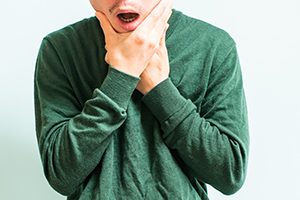
Is TMJ causing my pain?
TMJ stands for temporomandibular joint. Located just in front of the ear, it is the joint that connects your lower jaw to the rest of your head, allowing the jaw to move freely while biting, chewing, and speaking. Problems related to the TMJ can affect jaw muscles, teeth, and nerves associated with chronic facial pain. Times of stress can cause or aggravate TMJ since most of the discomfort is attributed to overuse of muscles during clenching or grinding of teeth (bruxism).
TMJ symptoms can manifest in different ways:
- A headache, especially in the temporal (side) region
- Soreness or stiffness of the neck
- An earache without an infection
- Jaw pain or soreness, especially in the morning or late afternoon
- Jaw pain when talking, yawning, or eating
- The jaw becomes stiff or locked when talking, yawning, or eating
- The clicking of the jaw joint
- Teeth are painful or sensitive, with no apparent dental problem
How is it treated?
Most of the time, TMJ cases can be treated with rest, a mild pain-killer, and/or practicing some relaxation techniques. Work diligently to break bad habits of clenching or grinding teeth, and if you experience bruxism at night, we can make you a comfortable mouth guard to prevent the extra wear and tear!




Comments are closed.